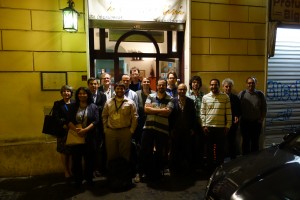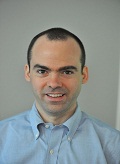Planning and Robotics (PlanRob)
The PlanRob workshop aims at constituting a stable, long-term establishment of a forum on relevant topics concerned with the interactions between Robotics and P&S communities. The workshop would present a stimulating environment where researchers could discuss about the opportunities and challenges for P&S when applied in Robotics.
Online Proceedings (planrob13proceedings)
PlanRob Chairs are glad to announce two notable invited speakers:

Dr. Malik Ghallab is a senior research scientist at LAAS-CNRS and University of Toulouse (Directeur de recherche). His research activity is mainly focused on planning, acting and learning in robotics and AI. He contributed to topics such as object recognition and pattern matching, scene interpretation, heuristics search, unification algorithms, knowledge compiling, temporal reasoning, planning, monitoring, and machine learning of robots skills and models of behaviors. Malik Ghallab was head of the French national interdisciplinary research program in Robotics (2000-2006), director of LAAS-CNRS (2003-2007) and Executive Officer for Research and Technology of INRIA (2007- 2010).

Stuart Russell is a Professor of Computer Science at UC Berkeley and Adjunct Professor of Neurosurgery at UC San Francisco. He is currently visiting UPMC and holds the Chaire Blaise Pascal (*). His research covers many aspects of artificial intelligence and machine learning. He is a fellow of AAAI, ACM, and AAAS and winner of the IJCAI Computers and Thought Award. His book “Artificial Intelligence: A Modern Approach” (with Peter Norvig) is the standard text in the field.
PlanRob has been extended!
Given the high number of accepted papers the PlanRob workshop is now scheduled on two days: the 10th (full day) and the 11th (half day – morning) of June in the “Aula Magna” room in the Department of Computer, Control and Management Engineering (DIAG), University of Rome “SAPIENZA”.
Day 1 – 10th of June 2013
|
09:00-10:00 |
Invited Talk Stuart Russell Life: Play and Win in 20 Trillion Moves |
|
Session “HTN planning” |
|
|
10:00-10:30 |
Iman Awaad, Gerhard K. Kraetzschmar and Joachim Hertzberg. |
|
10:30-11:00 |
Coffee Break |
|
11:00-11:30 |
D. Di Marco, R. Janssen, A. Perzylo, M.J.G. Van de Molengraft and P. Levi. |
|
Session “Using classical planners in high-level task planning” |
|
|
11:30-12:00 |
Scott Kiesel, Ethan Burns, Wheeler Ruml, J. Benton and Frank Kreimendahl. |
|
12:00-12:30 |
Siddharth Srivastava, Lorenzo Riano, Stuart Russell and Pieter Abbeel. |
|
Session “CSP/Timeline-based planning approach” |
|
|
12:30-13:00 |
Maurizio Di Rocco, Federico Pecora and Alessandro Saffiotti. |
|
13:00-14:00 |
Lunch Break |
|
14:00-14:30 |
Pablo Muñoz and Maria D. R-Moreno. |
|
Session “Task and Motion Planning” |
|
|
14:30-15:00 |
Fabien Lagriffoul. |
|
15:00-15:30 |
Chonhyon Park, Jia Pan, Ming Lin and Dinesh Manocha. |
|
15:30-16:00 |
Jonathan Cacace, Alberto Finzi, Vincenzo Lippiello, Giuseppe Loianno and Dario Sanzone. Integrated Planning and Execution for an Aerial Service Vehicle |
|
16:00-16:30 |
Coffee Break |
|
Session “Multi-robot coverage/exploration” |
|
|
16:30-17:00 |
João Valente, Antonio Barrientos and Jaime Del Cerro. |
|
17:00-17:30 |
Tomáš Juchelka and Miroslav Kulich. |
|
Session “Traveling problems” |
|
|
17:30-18:00 |
Mikko Lauri and Risto Ritala. |
|
18:00-18:30 |
T.K. Satish Kumar, Marcello Cirillo and Sven Koenig. |
|
20:00 |
PlanRob Social Dinner Picture courtesy of Jonas Kvarnström |
Day 2 – 11th of June 2013
|
09:00-10:00 |
Invited Talk Malik Ghallab Acting is the Purpose of Planning: the Actor’s view of Deliberation |
|
10:00-10:30 |
Kartik Talamadupula, Matthias Scheutz, Gordon Briggs and Subbarao Kambhampati. |
|
10:30-11:00 |
Coffee Break |
|
Session “Reasoning with Uncertainty” |
|
|
11:00-11:30 |
David Martínez, Guillem Alenya and Carme Torras. |
|
11:30-12:00 |
Vaishak Belle and Hector Levesque. |
|
12:00-13:00 |
Final Panel Discussion |
List of Accepted Papers
- João Valente, Antonio Barrientos and Jaime Del Cerro
Optimization of Aerial Surveys using an Algorithm Inspired in Musicians Improvisation - Tomáš Juchelka and Miroslav Kulich
Multi-Robot Exploration in the Polygonal Domain - Mikko Lauri and Risto Ritala
Path Planning in Dynamic Environments with the Partially Observable Canadian Traveller’s Problem - Fabien Lagriffoul
Delegating Geometric Reasoning to the Task Planner - Iman Awaad, Gerhard K. Kraetzschmar and Joachim Hertzberg
Affordance-Based Reasoning in Robot Task Planning - David Martínez, Guillem Alenya and Carme Torras
Planning Surface Cleaning Tasks by Learning Uncertain Drag Actions Outcomes - Chonhyon Park, Jia Pan, Ming Lin and Dinesh Manocha
RealTime GPU-based Motion Planning for Task Execution in Dynamic Environments - Scott Kiesel, Ethan Burns, Wheeler Ruml, J. Benton and Frank Kreimendahl
Open World Planning for Robots via Hindsight Optimization - Daniel Di Marco, Rob Janssen, Alexander Perzylo, Marinus J.G. Van de Molengraft and Paul Levi
A Deliberation Layer for Instantiating Robot Execution Plans from Abstract Task Descriptions - Maurizio Di Rocco, Federico Pecora and Alessandro Saffiotti
Closed Loop Configuration Planning with Time and Resources - Vaishak Belle and Hector Levesque
Robot Location Estimation in the Situation Calculus - Kartik Talamadupula, Matthias Scheutz, Gordon Briggs and Subbarao Kambhampati
There’s Planning, and There’s Planning - Siddharth Srivastava, Lorenzo Riano, Stuart Russell and Pieter Abbeel
Using Classical Planners for Tasks with Continuous Operators in Robotics - Pablo Muñoz and Maria D. R-Moreno
Deliberative Systems for Autonomous Robotics: A Brief Comparison Between Action-oriented and Timelines-based Approaches - T.K. Satish Kumar, Marcello Cirillo and Sven Koenig
On the Traveling Salesman Problem with Simple Temporal Constraints - Jonathan Cacace, Alberto Finzi, Vincenzo Lippiello, Giuseppe Loianno and Dario Sanzone
Integrated Planning and Execution for an Aerial Service Vehicle
Call for papers
Topics and Objectives
Robotics is one of the most appealing and natural applicative area for the Planning and Scheduling (P&S) research activity, however, this potential interest seems not reflected in an equally important research production for the Robotics and Planning communities.
On the other hand, the fast development of field and social robotics applications poses planning as a central issue in the robotic research with several real-world challenges for the planning community (e.g. continuous planning and execution with real-time constraints, deliberative and dynamic planning integrated with motion planning and reactive control, human-aware planning and execution, formal methods for plan-based autonomy, etc.).
In this perspective, the goal of this workshop is twofold. From one side, it aims at providing a fresh impulse for the ICAPS community to recast its interests towards robotics problems and applications. On the other side, it would attract representatives from the Robotics community to discuss their challenges related to planning for autonomous robots as well as their expectations from the P&S community.
The workshop aims at constituting a stable, long-term establishment of a forum on relevant topics concerned with the interactions between Robotics and P&S communities. The workshop would present a stimulating environment where researchers could discuss about the opportunities and challenges for P&S when applied in Robotics.
The workshop will deepen the debate on relevant aspects of application of P&S-based systems for robotic systems such as, but not limited to, the following:
- planning domain representations for robotics applications;
- robot motion, path and mission planning;
- integrated planning and execution in robotic architectures;
- planning and coordination methods for multi-robots;
- mixed-initiative planning and sliding autonomy for robotic systems;
- human-aware planning and execution in human-robot interaction;
- adversarial action planning in competitive robotic domains;
- formal methods for robot planning and control;
- P&S methods for optimization and adaptation in robotics;
- benchmark planning domains for robots;
- real-world planning applications for autonomous robots.
Submissions
There are two types of submissions: short position statements and regular papers. Position papers are a maximum of 2 (two) pages. Regular papers are a maximum of 10 (ten) pages. Papers should be submitted via the PlanRob 2013 EasyChair website: https://www.easychair.org/conferences/?conf=planrob2013
All papers should be typeset in the AAAI style, described at: http://www.aaai.org/Publications/Author/author.php removing AAAI copyright. Accepted papers will be published on the workshop website and printed as a hard-copy.
The organizers will investigate the availability of journal editors in order to invite higher quality papers from the PlanRob 2013 edition to a special issue or post-proceedings volume.
Any additional questions can be directed towards the general workshop contact email: planrob13@easychair.org
Deadlines
Paper submission (extended): April 4, 2013
Notification (updated): April 28, 2013
Final version: TBA
Workshop Date: June 10 and 11 (updated), 2013
Workshop Program Chairs
- Alberto Finzi, “Federico II” University, Naples, Italy
finzi@na.infn.it - Felix Ingrand, LAAS-CNRS, Toulouse, France
felix@laas.fr - Andrea Orlandini, ISTC-CNR, Rome, Italy
andrea.orlandini@istc.cnr.it
Program Committee
- Rachid Alami (LAAS-CNRS)
- Amedeo Cesta (ISTC-CNR, Italy)
- Tara Estlin (NASA JPL, USA)
- Alberto Finzi (Federico II University, Italy)
- Maria Fox (King’s College, UK)
- Malik Ghallab (LAAS-CNRS, France)
- Joachim Hertzberg (University of Osnabrueck, Germany)
- Felix Ingrand (LAAS-CNRS, France)
- Leslie Kaebling (MIT, USA)
- Sven Koenig (University of Southern California, USA)
- Maria Dolores Moreno (Universidad de Alcala, Spain)
- Karen Myers (SRI, USA)
- Andrea Orlandini (ISTC-CNR, Italy)
- Thierry Peynot (University of Sydney, Australia)
- Fiora Pirri (Sapienza University, Italy)
- Frederic Py (MBARI, USA)
- Alessandro Saffiotti (Orebro University, Sweden)
- Reid Simmons (Carnegie Mellon University, USA)
- David Smith (NASA Ames, USA)
- Siddharth Srivastava (UC Berkeley, USA)
- Florent Teichteil-Königsbuch (ONERA, France)
- Manuela Veloso (Carnegie Mellon University, USA)







